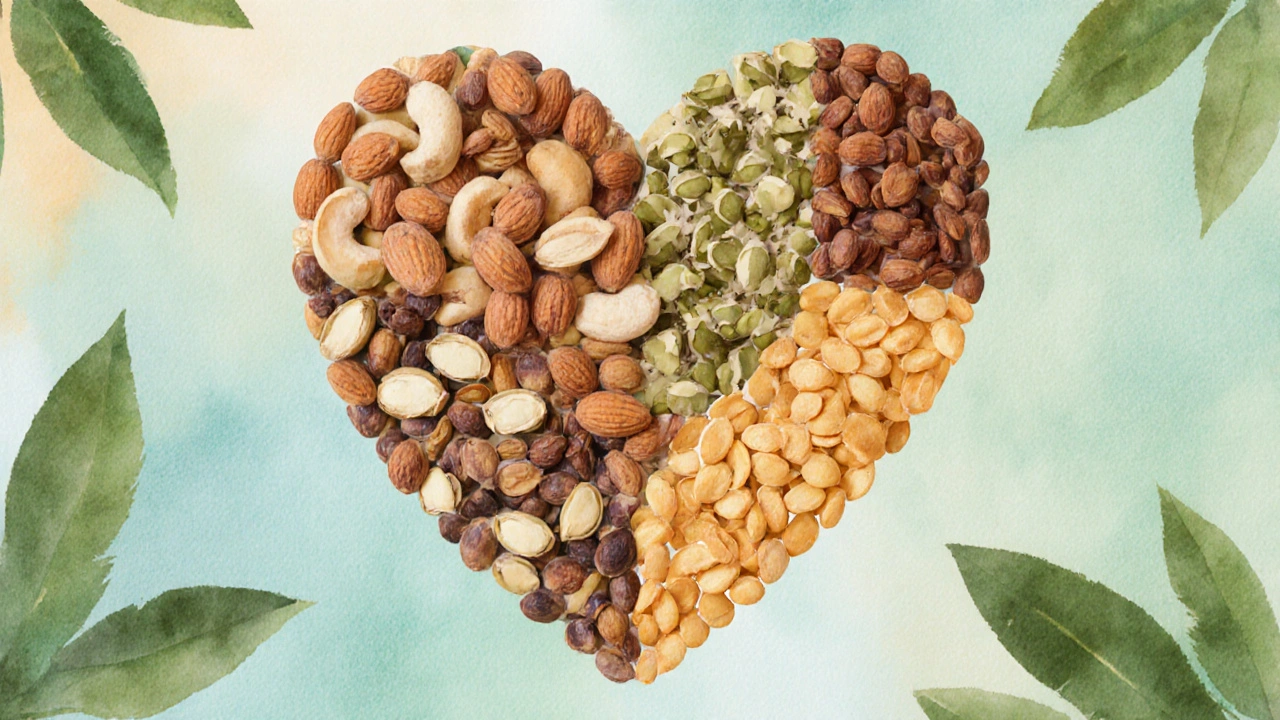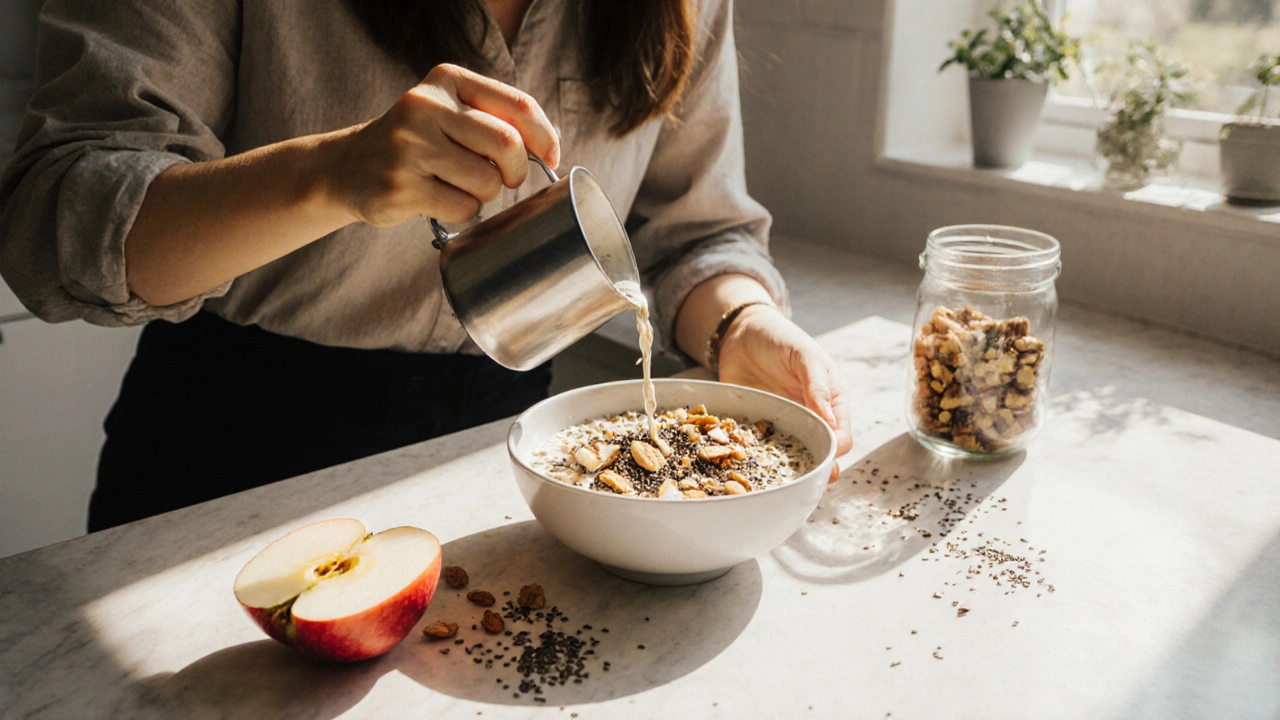When it comes to heart health, Nuts are nutrient‑dense foods that pack healthy fats, protein, and a host of vitamins. Seeds offer a similar punch of micronutrients, but in a smaller package. Both groups have been linked to lower cholesterol levels, especially the dreaded LDL particles that clog arteries. If you’ve ever wondered why a handful of almonds or a sprinkle of chia can feel like a mini‑miracle for your blood work, read on - the science is surprisingly simple and the kitchen tricks are delightfully tasty.
Key Takeaways
- Almonds, walnuts, pistachios, chia, flax and pumpkin seeds consistently reduce LDL cholesterol in clinical trials.
- Healthy fats, plant sterols, soluble fiber and magnesium are the main cholesterol‑busting nutrients.
- A daily serving (about a small handful) fits easily into most diets without excess calories.
- Allergies, portion control and medication interactions are the only real caveats.
- Incorporating a variety keeps taste buds happy and maximizes nutrient diversity.
Understanding Cholesterol: LDL vs. HDL
Cholesterol travels through the bloodstream attached to lipoproteins. LDL cholesterol (low‑density lipoprotein) is often labelled “bad” because it deposits cholesterol on arterial walls, increasing the risk of atherosclerosis. HDL cholesterol (high‑density lipoprotein) does the opposite - it scoops excess cholesterol away from arteries and transports it to the liver for disposal. The goal is a lower LDL‑to‑HDL ratio, which signals a healthier cardiovascular profile.
Why Nuts & Seeds Hit the Cholesterol‑Lowering Sweet Spot
Three core nutrients drive the cholesterol‑friendly effects:
- Plant sterols are structurally similar to cholesterol, so they compete for absorption in the gut, reducing the amount that enters the bloodstream.
- Omega‑3 fatty acids, especially alpha‑linolenic acid (ALA) found in walnuts, chia and flax, help lower triglycerides and modestly raise HDL levels.
- Soluble fiber binds bile acids (which are made from cholesterol) in the intestines, prompting the liver to use more circulating cholesterol to replace the lost bile acids.
Minerals like magnesium support vascular tone and reduce inflammation, further protecting the heart.
Evidence‑Based Picks: Which Nuts & Seeds Work Best?
Numerous randomized controlled trials (RCTs) have compared specific varieties. Here’s a quick rundown:
- Almonds: A 2011 RCT with 45 participants showed a 5% drop in LDL after 12 weeks of 1oz daily intake.
- Walnuts: The SUN cohort followed 2,800 Europeans for 8 years; regular walnut consumption correlated with a 7mg/dL lower LDL.
- Pistachios: A 2014 study noted a 4% LDL reduction after 4 weeks of 28g pistachios, plus a rise in HDL.
- Chia seeds: Rich in ALA, chia showed a 6% LDL decrease in a 6‑week trial among overweight adults.
- Flaxseeds: Ground flax (1tbsp) lowered LDL by 4-5% in several meta‑analyses.
- Pumpkin seeds: High in plant sterols, they contributed to a modest 3% LDL drop in a 10‑week study.
Notice the pattern - even modest daily portions (about 1oz or 28g) make a measurable impact.

How to Add Them to Your Day Without Over‑Eating
Portion control matters because nuts are calorie‑dense. A handy rule: one small handful (≈28g) per day equals roughly 160-200kcal. Here are practical ideas:
- Breakfast boost: Sprinkle 1tbsp chia or ground flax over oatmeal or Greek yogurt.
- Snack swap: Replace a bag of chips with ¼cup mixed nuts and seeds.
- Salad crunch: Toss pumpkin seeds or sliced almonds into leafy greens.
- Baked goods: Incorporate chopped walnuts into banana bread or muffins for extra texture.
- Smoothie power: Blend a handful of soaked walnuts with cocoa powder for a heart‑healthy chocolate shake.
For those watching carbs, opt for raw or dry‑roasted varieties without added sugars or excessive salt.
Potential Pitfalls & How to Navigate Them
Even the healthiest foods have quirks:
- Allergies: Peanut‑free nuts like almonds or seeds are safe alternatives for most nut‑allergic folks.
- Calorie surplus: If you’re trying to lose weight, measure servings rather than “grazing” straight from the jar.
- Medication interactions: High‑dose omega‑3 supplements can thin blood; talk to your doctor if you’re on anticoagulants.
- Digestive comfort: Some people experience bloating from too much fiber; increase portions gradually and stay hydrated.
Addressing these issues keeps the cholesterol benefits front‑and‑center without unintended side effects.
Nutrient Highlights of Common Cholesterol‑Lowering Nuts & Seeds
| Food | Plant Sterols (mg/28g) | ALA (Omega‑3) (g) | Soluble Fiber (g) | Magnesium (mg) |
|---|---|---|---|---|
| Almonds | 20 | 0.0 | 1.3 | 80 |
| Walnuts | 15 | 2.5 | 1.9 | 45 |
| Pistachios | 12 | 0.1 | 1.0 | 120 |
| Chia Seeds | 9 | 5.0 | 5.0 | 95 |
| Flaxseeds (ground) | 10 | 4.3 | 2.8 | 70 |
| Pumpkin Seeds | 14 | 0.0 | 0.5 | 150 |
Notice how each food brings a unique blend - mixing them gives you a broader nutrient spectrum, which research suggests maximizes LDL reduction.
Quick FAQ
How many nuts or seeds should I eat each day?
A typical serving is about 28g (a small handful) of mixed nuts or 1‑2tablespoons of seeds. This amount delivers the cholesterol‑lowering nutrients without adding too many extra calories.
Can I replace a medication with nuts and seeds?
Nuts and seeds are a powerful adjunct but not a substitute for prescribed statins or other cholesterol‑lowering drugs. Always discuss any dietary changes with your healthcare provider.
Are there any nuts that don’t help with cholesterol?
All nuts contain some heart‑healthy fats, but those low in plant sterols (like macadamia) show weaker LDL‑cutting effects. For maximum benefit, prioritize almonds, walnuts, pistachios and peanuts (in moderation).
Should I eat raw or roasted nuts?
Both are fine as long as there’s no added sugar, excess salt, or unhealthy oils. Raw nuts retain more natural antioxidants, while dry‑roasted nuts give a satisfying crunch without extra fat.
Can seeds replace nuts for someone with a nut allergy?
Absolutely. Seeds such as pumpkin, sunflower, chia and hemp supply comparable amounts of magnesium, fiber and omega‑3s, making them a safe and effective alternative.
Integrating a modest daily dose of nuts and seeds into your meals is a simple, tasty strategy that consistently nudges LDL lower and HDL higher. Pair that with a balanced diet, regular movement, and routine check‑ups, and you’ll give your cardiovascular system a real boost without reaching for a pill bottle every morning.

It's wild how a tiny handful of almonds can feel like a super‑hero cape for your arteries 🤔. Those nuts pack a punch of plant sterols, fiber, and magnesium that vibe together to keep LDL in check. Plus, the crunch factor makes it almost enjoyable to be healthy 😄.
Great rundown! Just remember to keep the portion to about a small handful so the calories stay in line. Mixing seeds with your breakfast oatmeal is an easy win.
I’d like to point out the correct term is “nutrient‑dense,” not “nutrient‑dense foods.” Also, the article could have clarified that plant sterols only modestly compete with cholesterol absorption.
Oh sure, just toss a handful of chia into your salad and you’ll magically become a heart‑healthy superhero. Because nothing says "I’m #fit" like swallowing a tiny puddle of gel.
Variety is the spice of life – swapping almonds for walnuts or pumpkin seeds keeps your taste buds guessing and your heart grateful.
The intricate interplay between the bioactive compounds found in nuts and seeds reveals a profound narrative of cardiovascular stewardship, one that transcends mere dietary advice and delves into the very architecture of human physiology. Each ounce of almonds delivers a cascade of plant sterols that, by virtue of structural mimicry, vie with endogenous cholesterol for intestinal uptake, thereby attenuating the serum concentration of low‑density lipoproteins. Walnuts, rich in alpha‑linolenic acid, orchestrate a subtle modulation of triglyceride synthesis while modestly elevating high‑density lipoprotein particles, a duality that underscores the elegance of omega‑3 pathways. Chia and flaxseeds, when ground, unleash a soluble fiber matrix capable of sequestering bile acids, compelling hepatic conversion of circulating cholesterol into new bile salts, a mechanism elegantly documented across multiple randomized trials. Moreover, the magnesium abundance in pumpkin seeds exerts vasodilatory effects, fostering endothelial resilience and mitigating inflammatory cascades that predispose to atherogenesis. These synergistic actions, when consumed consistently over weeks to months, culminate in a measurable reduction in LDL‑to‑HDL ratios, a prognostic hallmark of diminished cardiovascular risk. It is imperative, however, to balance these benefits against caloric density; uncontrolled snacking may inadvertently offset lipid improvements through excess energy intake. Portion control-approximately 28 grams per day-represents the fulcrum upon which therapeutic benefit pivots. The literature further suggests that the heterogeneity of nut and seed types confers a broader spectrum of micronutrients, and thus a more robust lipid‑modulating effect than any single variety alone. In practice, integrating a medley of almonds, walnuts, pistachios, and a sprinkle of chia into one’s daily regimen can be both palatable and scientifically grounded. This culinary strategy aligns seamlessly with broader lifestyle interventions, including regular aerobic activity and weight management, to forge a comprehensive approach to heart health. Ultimately, while nuts and seeds are not a panacea, they constitute a potent, accessible, and enjoyable adjunct to conventional lipid‑lowering therapies, reinforcing the axiom that food truly can be medicine.
Nuts are the best plain and simple
Sure, just toss a handful of walnuts into your morning smoothie and watch the LDL melt away like butter on toast. It’s almost comical how such a simple habit can outshine a whole pharmacy shelf.
While the enthusiasm is appreciated, remember that consistency beats occasional extravagance. A daily sprinkle ensures steady nutrient intake without triggering calorie overload.
Exactly! Consistency is the unsung hero of heart health. Keep the nuts rolling in your diet and watch the numbers improve.
The data on magnesium is particularly compelling; studies show an average increase of 10 mg/dL in HDL when participants added pumpkin seeds daily. This aligns with the article’s emphasis on mineral synergy.
That magnesium boost really helps the vessels stay relaxed, especially for folks battling hypertension. It’s reassuring to see the science back up the practical tips.
While the article is thorough, it neglects to address the variability in nut processing methods and their impact on phytochemical retention. Roasting at high temperatures can diminish certain antioxidants.
Indeed, opting for raw or low‑temperature dry‑roasted varieties preserves more of the beneficial compounds. It’s a small tweak with notable payoff.
I switched to raw almonds last year and noticed a subtle improvement in my post‑prandial lipid panel. The difference, though modest, felt encouraging enough to stay the course.
Honestly, I think the hype around nuts is overblown – you can get similar benefits from a balanced diet without the extra calories.
Perhaps we should also consider cultural dietary patterns; many traditional cuisines incorporate seeds in ways that are both flavorful and health‑supportive.
👍😊
Mixing nuts with fresh berries makes the snack feel like a dessert without the guilt.